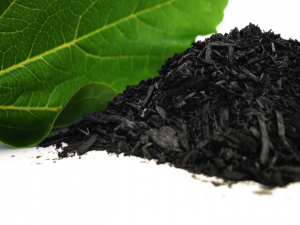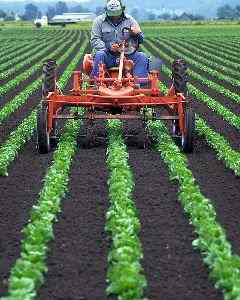Biochar is produced by the carbonization of ACTOF®, or other thermally treated biomass, via pyrolysis. STC's patented, proprietary two-stage carbonization process enables the production of engineered biochar that can be utilized as a soil amenity. Application of biochar to the soil not only provides a thriving environment for the essential soil microbes and fungi, but also separates CO2 from the atmosphere into the soil for hundreds of years creating a carbon-negative pathway.
Biochar will play a vital role in fostering a climate-smart agricultural platform achieving the following functions:
- Encourgage natural and organic farming.
- Increase resiliency in livelihoods from small-scale farms globally.
- Increase farm productivity without adverse effects on climate.
- Foment a sustainable pathway towards climate-smart agriculture and mitigate GHG gases.
Restoring only 10% of the world's degraded agricultural soils can help feed over 100 million people in the next decade.
The volatiles liberated from production of biochar can be combusted for the process' thermal energy or condensed to produce a renewable, low-acid, pyrolytic oil. The pyrolytic oil can be further refined to produce renewable transportation fuels and chemical feedstocks. Alternatively, the pyrolytic oil can be thermally decomposed to produce renewable Carbon Black. STC's patented two-stage carbonization process can also produce engineered BioCarbon Minerals (BCM) from a variety of biomass residues to be used as a soil amenity.
Carbon's journey through the soil powers life as we know it - As global temperatures rise, there's growing interest in getting carbon dioxide (a greenhouse gas) out of the atmosphere and getting carbon into the soil. But what form does that carbon take and how, exactly, does the cycling process work?
Biochar for Carbon Feed
According to the US EPA, Concentrated Animal Feeding Operation (CAFO) is an animal feeding operation that confines animals for more than 45 days, in an area that does not produce vegetation and meet certain size thresholds. As a result, CAFO's are plagued with health related problems for the animals. This in turn dictates the use of expensive antibiotics to prevent an epidemic within the CAFO.
Biochar can be engineered to be used as a supplement in livestock feed which can reduce the need for expensive antibiotics and medicines for livestock in CAFO environments. Biochar based carbon feed can help to regulate livestock digestive systems by enhancing nutrient absorption and sequestration of pathogens.
Responsible animal husbandry utilizing biochar-based carbon feed can help towards efficient livestock management and sustainable food production in the years to come.







